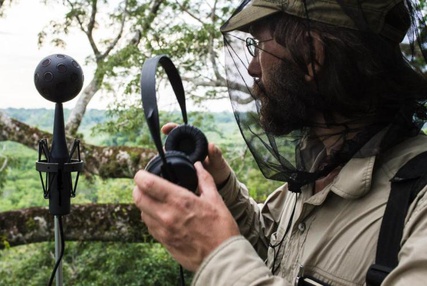
À l’origine du projet Fragments of Extinction se trouve un constat initial : avec l’extinction des espèces et le dérèglement des habitats naturels, les structures sonores produites par l'évolution au cours de millions d'années d'adaptation acoustique interspécifique sont en déclin rapide ; dans un avenir proche, il ne sera peut-être plus possible de les entendre dans leur état d'origine.
Utilisant les technologies d’enregistrement tridimensionnel avancées, le compositeur éco-acoustique David Monacchi mène depuis 1998, avec son équipe, des campagnes d’enregistrements sur le terrain et part à la découverte des principales régions tropicales – y compris des sites classés au patrimoine mondial, et des zones strictement protégées – où de grandes zones de forêts vierges intactes sont encore présentes.
David Monacchi veut rassembler, étudier et diffuser les paysages sonores de cette biodiversité encore intacte dans le but de la préserver et de rendre public cet héritage.
Sa résidence de recherche artistique, menée de 2017 à 2018 en collaboration avec l'équipe Espaces acoustiques et cognitifs de l'Ircam et le ZKM, se concentre sur les données collectées lors des enregistrements de terrain, dans les coins vierges de l’Amazonie et de Bornéo. Elle explore la complexité sonore de ces écosystèmes.
Le but est de démontrer comment, à partir de l’enregistrement d’espaces encore préservés, on peut extraire des données utiles pour des explorations bioacoustiques et écologiques, et parallèlement, construire un alphabet d’un nouveau langage « musical » fondé sur l’analyse et la recomposition d’un véritable écosystème.
Ce séminaire présente le projet à long terme du compositeur.
David Monacchi (Italie) est lauréat du programme Musique de la Cité internationale des arts, en partenariat avec l’Ircam et le Centre d’art et de technologie des médias de Karlsruhe (ZKM).



